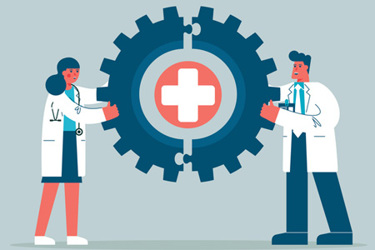Bridging Clinical Research And Care With TransCelerate's Rob DiCicco
A conversation with Rob DiCicco, vice president of portfolio management at TransCelerate BioPharma

Clinical trials that support the development of new and innovative therapies and healthcare delivery are fundamentally supported by separate infrastructures, processes, and objectives. This comes with unique sets of capabilities, staffing, regulations, data platform systems, and incentives. But patients could be better served by a future that breaks with the status quo and unlocks the power of data to answer regulatory questions and inform clinical practice.
Rob DiCicco, who brings extensive experience from leadership roles at IBM Watson Health and GlaxoSmithKline to his role at TransCelerate, offers insights into why bridging these worlds matters and the challenges that must be overcome to realize this vision.
Clinical care and clinical research are often considered two separate paths for patients seeking healthcare. How would you define clinical care and clinical research?
For me, the real question isn't how they're defined, but why do they remain two separate infrastructures? Care facilities exist to manage health on both individual and public health levels. Clinical research, on the other hand, is about collecting high-quality data for various purposes — regulated drug research, effectiveness research, comparative effectiveness, and safety monitoring.
The broader enterprise of healthcare delivery isn't necessarily equipped, trained, capable, or practically able to support different research opportunities. There are cost, time, and risk elements to running separate infrastructures. If we could solve that, we might see an acceleration of drug development, containment of costs, and more representative participation in clinical trials. This has public health implications as well as commercial implications.
The purpose of clinical research is often described as determining safety and efficacy for investigative treatments. Is it just that or something more?
It's far beyond that. I would expand this to include data collection to answer a broad range of questions. Those questions surely include safety and efficacy for investigative medicines, but they also include characterizing the burden of illness, comparative benefit and effectiveness of marketed medicines, long-term safety monitoring and efficacy of marketed medicines, and observational trials. Other examples include validation studies for novel endpoints that are more patient-relevant, along with the supporting technology.
Something very important happens when you start to collect somebody's personal health information. There are serious considerations related to what you do with that information, how you keep it safe and create transparency around its purposes. We're living in an era where all types of personal data — not just health data, which some might consider the most sensitive — are somewhat at risk just by the nature of the integration of emerging technology into our daily lives.
You can collect data to inform regulatory decisions or to answer other types of research questions with appropriate permissions. As data collection becomes easier and monetization moves closer to the point of data generation, there are massive implications for people who work in healthcare, for the public, and for regulatory and policy groups.
How can clinical care and clinical research overlap or supplement one another, and why is doing so advantageous?
There are opportunities present today where the information needed to answer a research question could be collected simultaneously during routine care. There are examples like the lung cancer study called Pragmatica-Lung, sponsored by the Southwest Oncology Group (SWOG) with support from major pharma companies.
In this study, they're only collecting necessary information to answer very targeted research questions about marketed products for a different indication. It's highly efficient. Patients aren't required to participate in extra procedures unique to the protocol — they would have been undergoing these procedures and data collection anyway as part of routine care.
This approach significantly and meaningfully reduces the burden on patients to participate and care providers to support. It also has the potential to expand the geographic locales where patients can participate. If you're getting routine cancer care in a facility that might be 3 hours from a dedicated research hospital, your provider may now be able to participate, creating new opportunities for you to contribute your data.
The challenge today is that this hasn't been industrialized or scaled. There are commercial incentive reasons, legal issues, limitations in our ability to exchange healthcare data from EHRs into systems that analyze data for regulatory submission, awareness issues, and perceived regulatory risk in collecting minimal information. There's also a mindset issue.
Can it be done? Yes. Another example is clinical research for COVID-19 vaccines and treatments, such as the U.K.'s RECOVERY trial, which demonstrates the collection of research-grade data at the point of care. The question becomes: What are the barriers to scaling this? This approach won't describe the entire universe of all pharma R&D studies, but it will simplify and accelerate an important percentage of the work. Capturing the mindset from trials like this, replicating the cooperation across stakeholders, and improving upon its shortcomings should be part of a blueprint.
What is your take on the current state and uptake of this combined care model?
I think areas like oncology and rare disease are gaining traction, but there's still a long way to go. Even in those areas, whatever you do to set up the technical, contractual, and other ancillary support environments for current studies, there's limited ability to rinse and repeat for the next study. You would have to start all over again.
There are templates and examples — what I call a "trail of breadcrumbs" — that are road signs to how to do this. It will likely take partnerships across various segments of the ecosystem to align incentives, solve technical challenges, and achieve regulatory clarity.
I don't want to underestimate the work needed to continue building public trust. Only a small percentage of potentially eligible patients actually participate in clinical trials. Furthermore, access differs by locale and is influenced by various social and economic factors. The broader universe of patients is primarily concerned with access to care, understanding their disease, living with their disease and quality of life — not answering research questions or getting a drug approved.
There's a gap in public trust around questions like: Can I trust this vaccine? Can I trust how this drug was developed? Can I trust this investigational medicine versus something already proven in thousands of patients? Can I trust leaving my personal physician for a research trial led by a physician I don't know?
To get to a future state, it takes a holistic plan to solve for the technical gaps, regulatory gaps, incentive gaps, and building of trust. There are many organizations, both public and private, interested in investing in this. The way drugs are being discovered will demand a new development model. Pricing pressures, economic pressures, and technological evolution are highlighting the opportunity to leverage data collected at the point of care for multiple purposes, but only if it is done ethically and transparently.
What are some challenges of implementing and delivering a combined care model?
Data exchange is a challenge. Public trust is a challenge. The complexity and burden of participation is a challenge that's owned by the industry and sponsors — the protocols themselves are too complex and burdensome. They are designed to answer a regulatory question but sometimes do not help to inform clinical practice.
The restrictive nature of inclusion/exclusion criteria is often a problem. When you implement these criteria, you're trying to find some balance between isolating confounding factors and isolating the true effect of the intervention versus noise. But what you might find is you've developed a very precise answer to a question that might only apply to a very small portion of the population.
Infrastructure support is another challenge. Globally, facilities set up primarily for care provision are highly “taxed.” There's stress in the healthcare system that leaves little additional time for research procedures beyond routine care. There's something about both capacity within routine care sites and capability from training, experience, and quality perspectives that remain significant gaps.
Who will contribute to filling those gaps? What funding will come from government versus private sources? There are initiatives across the globe in a dynamic state of flux. The role for consortia like TransCelerate might not be funding, but it could be know-how, simplification of trials to reduce demand and burden on practice sites, or informing technical solutions for data exchange.
Why should sponsor companies be interested in this model, and what can they do to begin exploring and implementing it?
They should be interested because the discovery of new medicines has evolved to be driven by molecular biology and genetics. Our understanding of disease mechanisms and the role different systems and genetics play is changing how drugs are discovered. The traditional model that’s in place for recruiting sites and patients may not be the best to support the way drugs are actually being discovered.
It's hard to ignore the impact of technology, data availability, data exchange, and insights from data to inform smarter trials, expand the pool of eligible patients, and address problems related to eligibility and complexity. Every company is making individual investments in this, but pharma sponsors work with a common ecosystem of provider sites, regulators, labs, and other third parties. Some similarity in approaches will help support efficiency gains.
There are a host of processes and instruments (templates, trainings, toolkits, etc.) that can enable these efficiency gains in the short term. Likewise, the development and implementation of data standards —while challenging from a change management point of view — clearly creates opportunities for not only efficiency but innovation.
Lastly, there's been little to no net improvement in cycle times and recruitment for clinical trials for over 15 years. From an R&D productivity standpoint, this has to improve to be sustainable. Almost every sponsor company has sustainability and carbon footprint objectives. Running two separate infrastructures with the technology, people, and travel involved makes meeting those requirements challenging if we continue operating as we have for decades.
There are many organizations working on this problem. It's like those team-building exercises where everyone has different components but no blueprint, and no one person has all the parts needed. The exercise is meant to have a team of individuals figure out how to align on a blueprint and share resources. We're investing significant energy in understanding who we fit with, who could be thought partners, and what we can contribute to this effort. TransCelerate has taken on challenges that are very different — and increasingly complex — compared to what we tackled in our first decade.
About The Expert:
 Rob DiCicco is vice president, portfolio management at TransCelerate BioPharma, a nonprofit consortium of 20 global biopharmaceutical companies. TransCelerate is dedicated to improving the health of patients by accelerating and simplifying the clinical R&D process. Rob joined TransCelerate from IBM Watson Health where he was the deputy chief health officer. At IBM, he worked closely with software teams to inform product roadmaps and assess the performance of e-clinical solutions.
Rob DiCicco is vice president, portfolio management at TransCelerate BioPharma, a nonprofit consortium of 20 global biopharmaceutical companies. TransCelerate is dedicated to improving the health of patients by accelerating and simplifying the clinical R&D process. Rob joined TransCelerate from IBM Watson Health where he was the deputy chief health officer. At IBM, he worked closely with software teams to inform product roadmaps and assess the performance of e-clinical solutions.
Prior to joining IBM, Rob served in a variety of leadership positions at GlaxoSmithKline, including as vice president of clinical pharmacology sciences and study operations. In addition to his GSK responsibilities, Rob also led TransCelerate’s Common Protocol Template and Digital Data Flow workstreams and served as team lead for the Clinical Trials Transformation Initiative (CTTI)-sponsored Mobile Clinical Trials Novel Endpoints project. Rob received his Doctor of Pharmacy from the University of the Sciences in Philadelphia.
